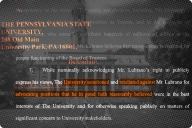You have /5 articles left.
Sign up for a free account or log in.
We had some very interesting discussions in our Strategy and Competition in Higher Education class last night (course description and syllabus) about substitutes for higher education and whether everyone should go to college.
So far this semester we’ve covered the context for US higher education (e.g., history, major trends and issues), buyers (e.g., students, parents, recruiters), and suppliers (e.g., faculty and publishers). Last night we focused on the topic of “substitutes” for higher education (see QuickMBA for a good overview of the general concepts of Porter’s Five Forces, including substitutes) and whether they will become more attractive as the cost of obtaining a degree continues to rise and new alternative products and services emerge.
Prior to the class discussion we asked students to listen to an NPR debate on Do Too Many Kids Go To College? and watch The College Conspiracy. These two “pre-readings” had people primed to talk about whether there is a higher education bubble, what value higher education provides to both the individual and society, and whether the fact that knowledge is no longer a scarce resource make a college degree more or less valuable. We had an excellent discussion with a lot of points and counterpoints, but ultimately not much consensus.
The latter half of the two-hour class was perhaps the most interesting part of the discussion, when we turned to the idea of substitutes for higher education and started with the question of what people are “buying” when they pursue a college degree. The list generated included knowledge, critical thinking skills, exposure to new ideas, maturation, social skills, and certification. So, we asked: Are there other ways to achieve these goals/knowledge/skills than through going to college?
Initially the ideas of getting a job, joining the military or starting a business came up but students found these propositions lacking the benefits of learning new ideas from classes you “have” to take, networking, and signaling that a college degree provides. Fair points, and I’ve had similar questions on the idea of a degree as a signal to employers and how certifications and badges would be measured in terms of quality – if they’re not accredited in the way degrees are now, would we need an alternative “Good Housekeeping Seal of Approval?”
And, right before we ended, we discussed the idea of “hacking” higher education by putting together ones own higher education experience (potentially without any type of transcript or certification) and websites/movements like UnCollege that are devoted to making people think about the possibilities of customizing their education, making it both just-in-time and lifelong through an amazing array of opportunities and offerings – including ways to signal. This could be the way of the future . . .
What do you think? Now that knowledge is widely available – and much of it free – does a college education add considerable value to the individual (relative to its cost) or is it primarily a signaling device?





